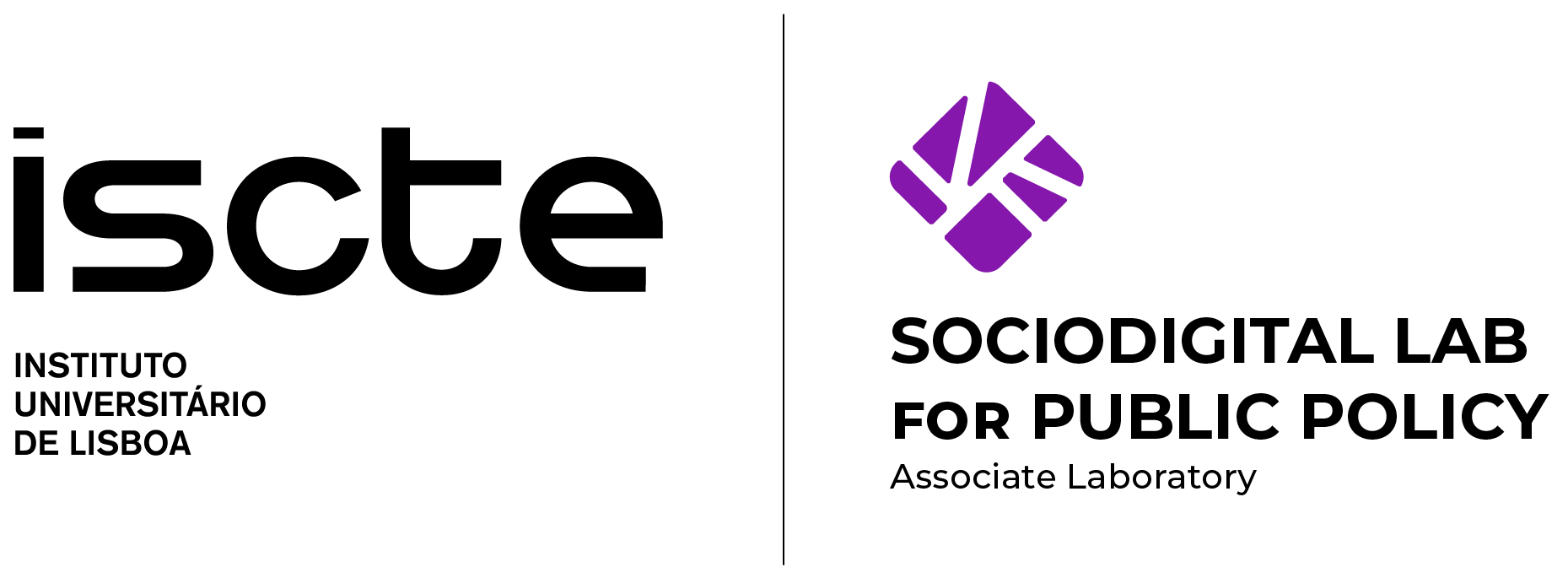The SocioDigital Lab for Public Policy is organized around five interdisciplinary thematic lines providing a basis for innovative solutions to today’s global challenge.
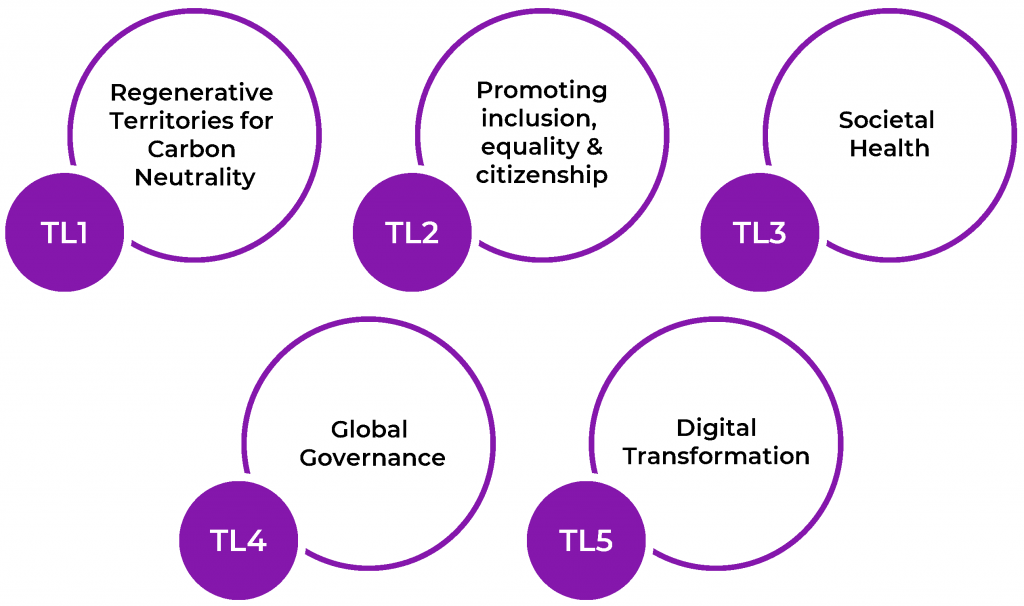
Impact cases
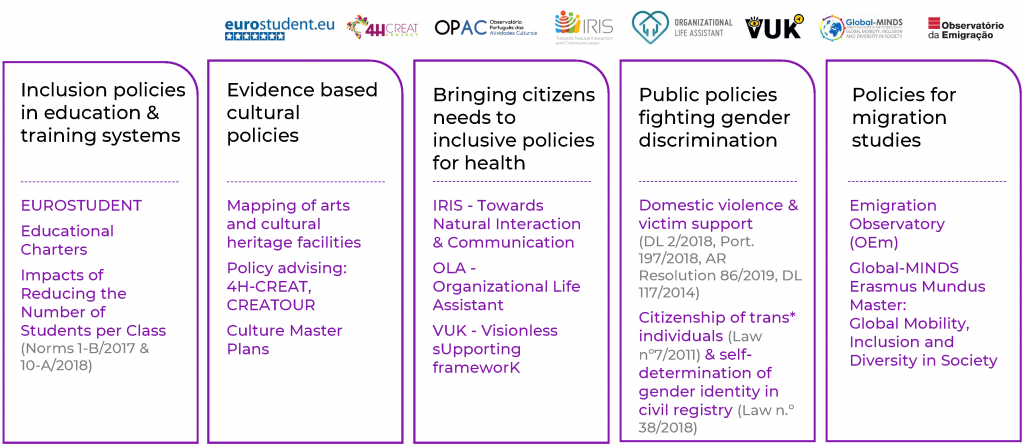
Regenerative Territories for Carbon Neutrality
THEMATIC LINE 1
COORDINATORS
MAIN OBJECTIVES
- Contribute to a more sustainable planning of cities and territories, in order to address current social, economic, cultural and environmental challenges – specifically in fields such as housing, mobility, public space, social inclusion and the organization of social and economic activities (tourism, creative dynamics, food-energy-water supply, platform economy), supporting the consolidation of communities where relationships with others and with the place are meaningful and integrative. Policies and planning instruments at local, municipal, regional and national levels in these areas will be focused towards developing more integrated and inclusive territories and communities.
- Promote the involvement and response of communities, including public and private organizations, to environmental public policies for mitigation and adaptation to climate change, namely in the fields of energy policy and nature and biodiversity conservation. TL1 aims to contribute specifically to the monitoring of an inclusive and successful implementation of the National Plan for Energy and Climate 2030 and the Roadmap for Carbon Neutrality 2050 and associated public policies, in relation to their psycho-social, environmental, economic and social impacts.
- Co-creation of knowledge, collective action and new forms of citizenship, through participative processes, contributing to the transition to territorial sustainability through a bottom-up, multi-scale perspective (from local to transnational action), enhancing the involvement of local communities One possible development of this objective is the creation, in association with TL5, of the Portuguese Observatory for Inclusive Sustainability Transitions (POIS).
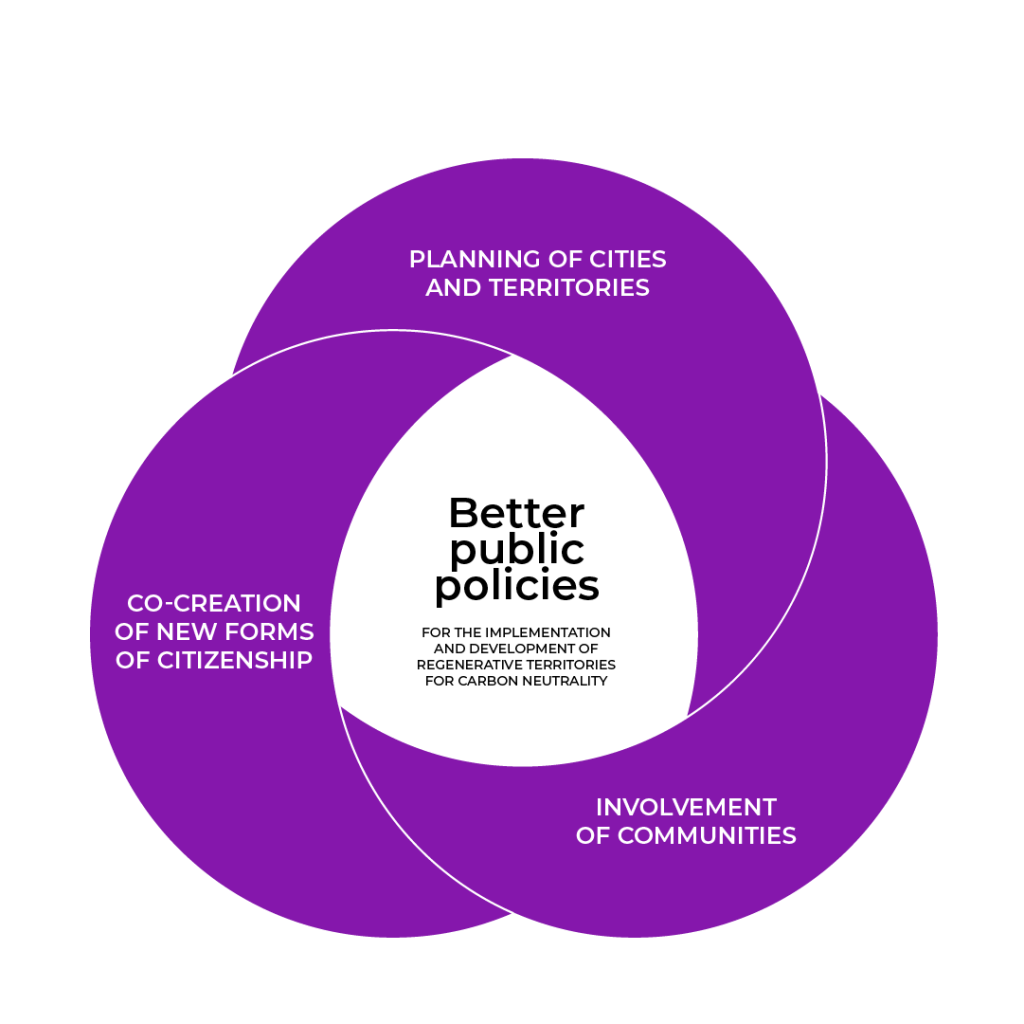
KEYWORDS
Territorial development, resilient cities, circular communities, transitions to sustainability
Promoting Inclusion, Equality and Citizenship
THEMATIC LINE 2
COORDINATORS
MAIN OBJECTIVES
- Analysis of school trajectories, family socialization, and transition to active life.
Identification of inequalities produced by social and cultural forms of reproduction in the educational system and their repercussion on the transition to active and professional life. This will require the study of the relationship between school trajectories, family socialization, and the beginning of professional paths, from early childhood to the transition to working life. TL2 will contribute to policies aimed at reducing early school leaving and promoting forms of training and education that favour equal opportunities. - Analysis of the dynamics of the labour market, professional trajectories, and models of social protection.
Study of professional trajectories in the labour market to identify the modalities of non-standard employment and social vulnerability. An inventory and evaluation of social protection policies and systems, at the national, European, and international level, as well as coverage and eligibility. We will contribute to inclusive employment policies that deepen and broaden the scope of social and labour protection of the employed and unemployed population; and design policies that promote social protection in a rationale of universality of coverage, sustainability, and adequacy of the system. - Analysis of quality of life levels and promotion of citizenship.
Study of the inequalities produced by different practices of citizenship (at various levels) and standards of quality of life, namely those based on ethnic and migratory diversity, age, gender, sexuality, language, religious identity, status, functional/(dis)ability diversity, and other dimensions associated with greater social vulnerability. This will study of the promotion of citizenship in a broad way, inclusiveness, and full accessibility to services (including digital ones) and the built environment with the primary objective of improving the quality of life of citizens and people with vulnerabilities. We will contribute to the promotion of a broad digital citizenship and to policy measures that enable the implementation of informational and knowledge society, responding to the current requirements of online access, communication and collaboration, using digital services and inclusive collaborative tools, reducing generational, cultural and physical barriers.
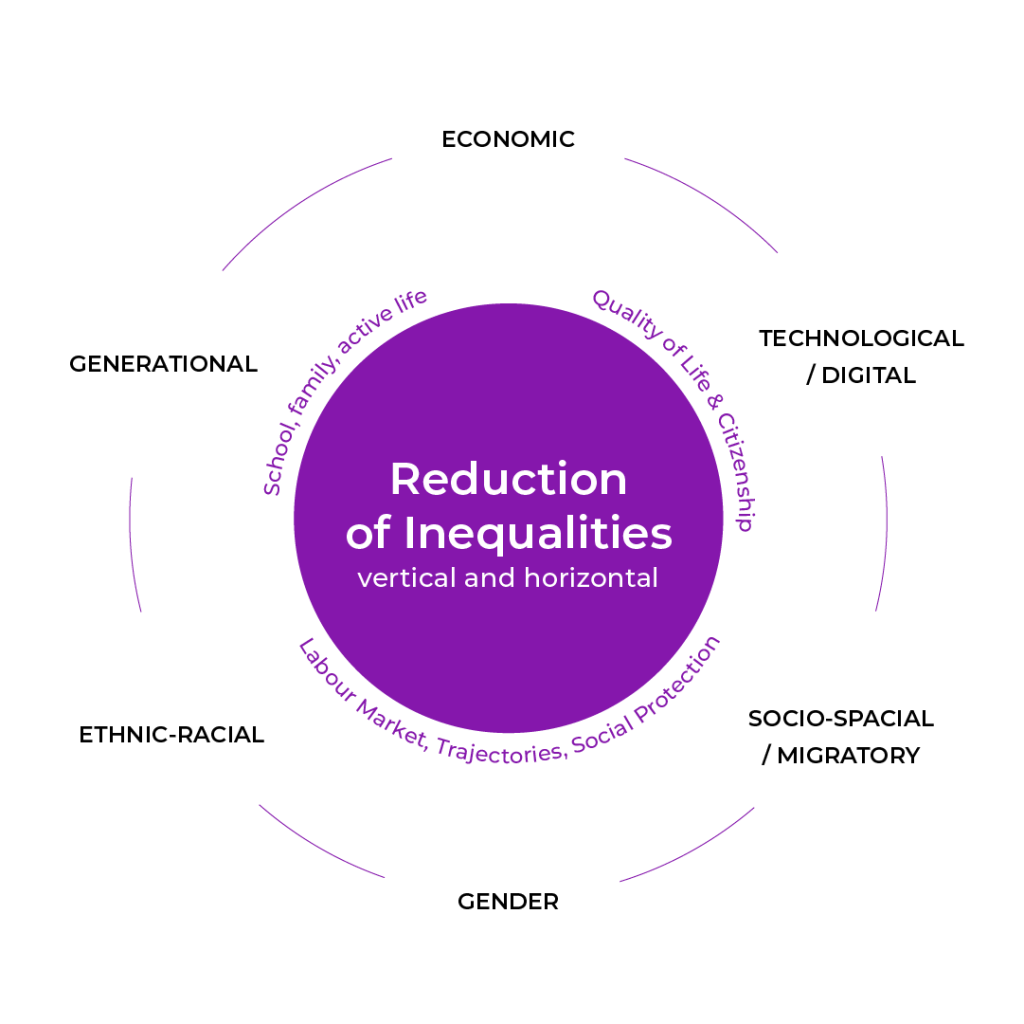
KEYWORDS
Inequalities, gender, education, labour
Societal Health
THEMATIC LINE 3
COORDINATORS
MAIN OBJECTIVES
- Promoting healthier lifestyles and preventing diseases.
Much of the existing data on health and work conditions tend to have an illness-based perspective that excludes citizens representations, social capital or wellbeing as relevant dimensions of health. Our goal is to produce an up-dated and integrated view of population-wide health behaviors, lifestyles, and working conditions by articulating psychosocial, sociological, and biomedical data. - Reducing the burden of chronic illnesses and improving health-related quality of life.
Life expectancy in Portugal has increased and so did the number of people living with chronic diseases and disabilities. Technological solutions such as ambient assisted living, personalized self-care and automatic decision tools exist, but often these systems are not co-produced with end-users. Our aim is to develop our research and contacts with stakeholders in order to empower patients and families by providing them with tailored knowledge, capacities, digital skills, and resources that promote the self-management of diseases through customized recovery plans, taking advantage of digital tools and communication - Protecting sexual and reproductive health & rights.
Portugal has one of the lowest fertility rates in the OECD, with a declining population that threatens not just economic sustainability but also cultural and sociological dimensions. We intend to further develop and upscale the existing Lab on Social Studies on Birth (nascer.pt), in order to produce and disseminate scientific information that support public policies around sexual and reproductive health and promote a serious and comprehensive debate on ethics, representations, choices, behaviors and practices that shape it. - Reducing health-related inequities.
High inequalities in health are a threat to fair and ethical policies, as they exclude the more vulnerable from equal access to quality health‐related goods and services. Along with the Observatory on Inequalities (TL2) and using data science techniques, we will contribute to the production of information on health-related inequalities that expose gender, age, ethnic-racial and social class disparities in health and healthcare and allow participatory approaches in health service and policy development, planning and delivery. - Promoting the effectiveness of health systems and services.
Our aim is to integrate a technological approach (data integration, data analytics, text mining, machine learning) with process management and organizational practices in more patient-centred health services, where adaptability and cooperation are core competences.
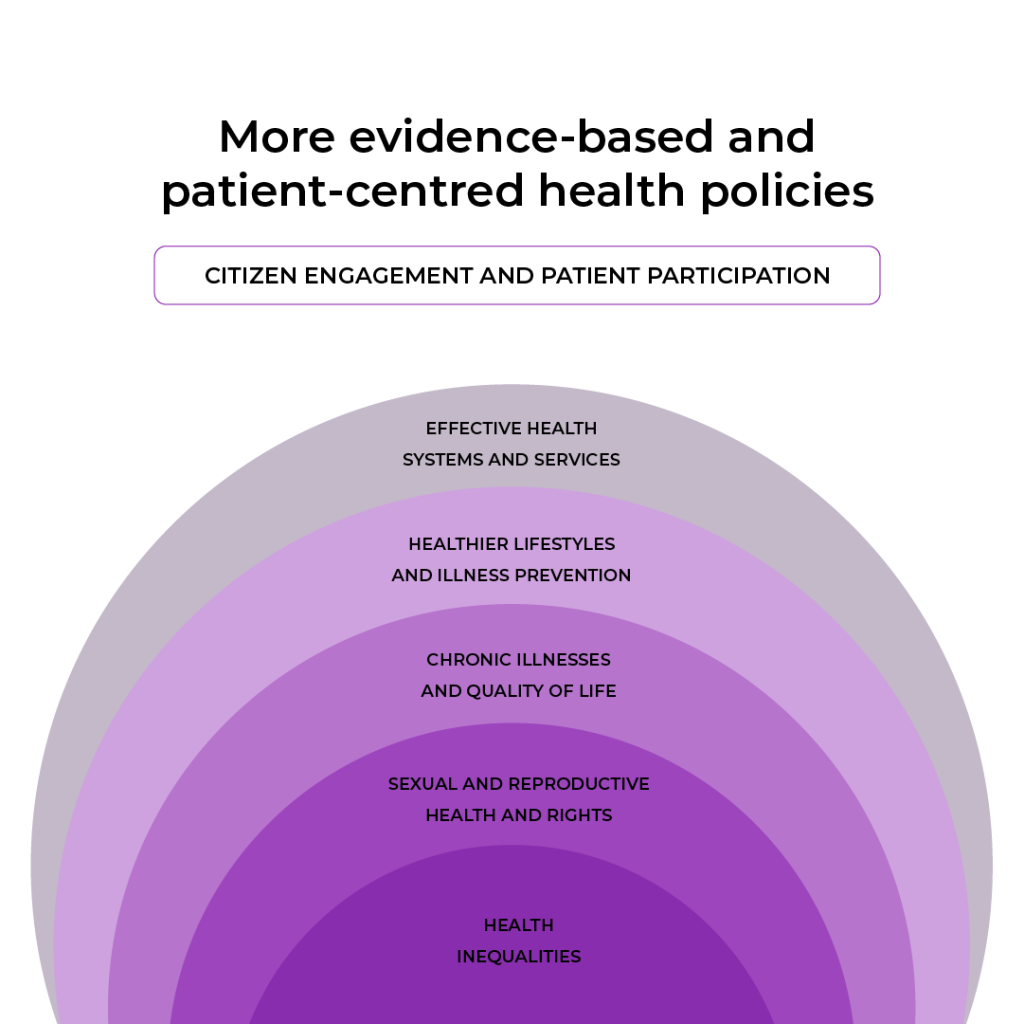
KEYWORDS
Health equity, Societal wellbeing, Digital health pathways, Chronic diseases, Smart living environments, Health systems effectiveness
Global Governance
THEMATIC LINE 4
COORDINATORS
MAIN OBJECTIVES
- For Public Policy:
.To offer a holistic approach on migration to relevant stakeholders and policymakers that considers the complex interplay between multiple actors and systems at the local, national, and international levels, based on the latest scientific evidence;
.To provide evidence-based and culturally sensitive training as well as technical and logistical support to the different phases of humanitarian emergency assistance – preparedness, response, mitigation, and recovery;
.To employ new and existing datasets to produce evidence-based practical and technical solutions to strengthen the effectiveness of civil societies and institutions, e.g. through the development of ICT applications that can increase political accountability and foster migrant integration through digital inclusion; - For Scientific Advancement:
.Advance theoretical and empirical knowledge on societal, institutional, and psychosocial determinants of international migration and factors hindering and fostering integration and inclusive citizenship of migrants and refugees by relying on cutting-edge multi-level and mixed methods approaches supported by state-of-the-art data science techniques, and participatory research approaches;
.Offer a critical debate of the territory as both reflection and instrument of social change, exploring the potential of planning tools and urban policies as contributors to inclusive, secure, and trusting societies, promoting the right to an adequate standard of living; - For International Projection:
.Secure third-party funding from national and international agencies and programs, as well as participate in, and coordinate, international consortiums focused on key societal challenges in the global governance agenda;
.Strengthen international collaborative networks of academic institutions, public administrations, international agencies, and non-governmental organizations working towards profound impacts in decision-making, as well as training present and future professionals and promoting knowledge transfer;
.Build upon and expand Iscte’s experience in doctoral and postdoctoral training by developing innovative interdisciplinary doctoral and postdoctoral training programs in the four operational areas.
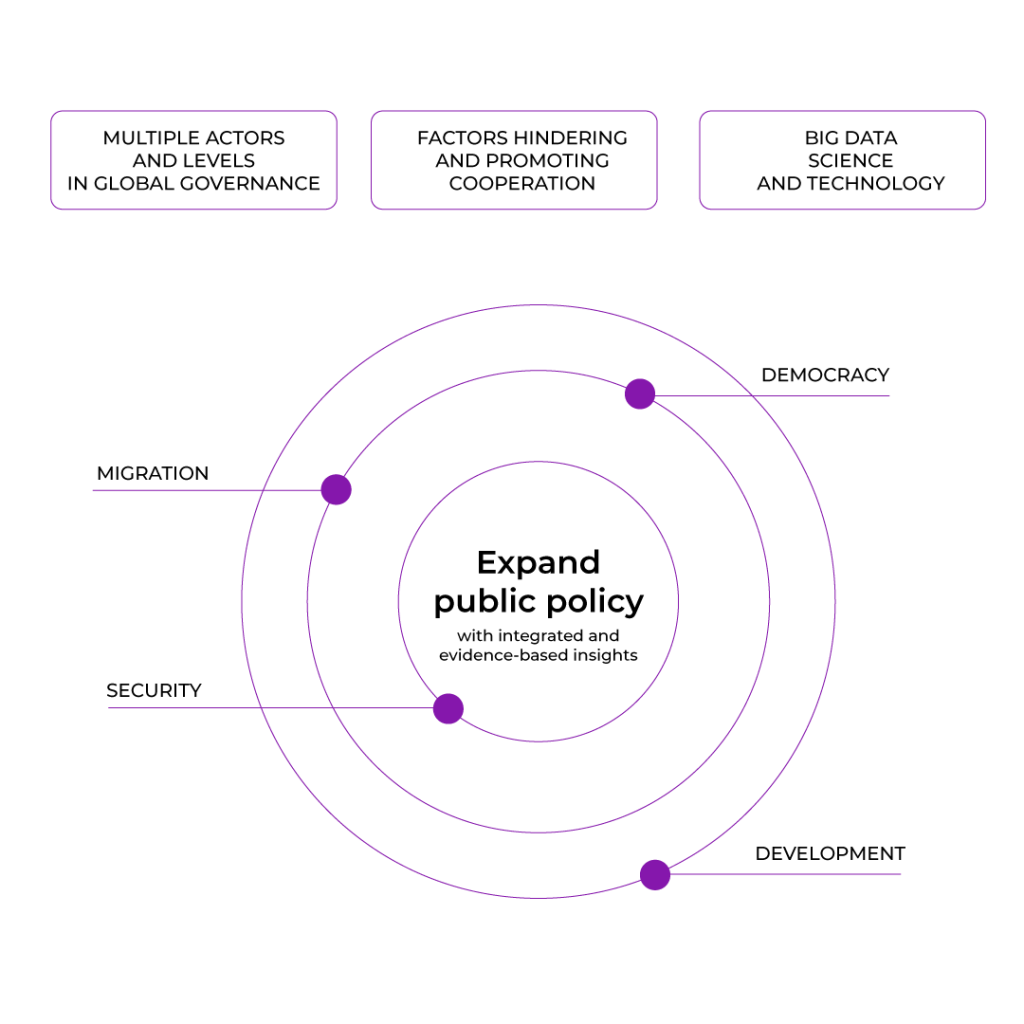
KEYWORDS
Migrations, Democracy, Security, Development
Digital Transformation and Public Policies
THEMATIC LINE 5
COORDINATORS
MAIN OBJECTIVES
- Data, Artificial Intelligence, and Citizens Trust.
The growing use of AI and machine learning has increased concerns about complex algorithms using big data, producing unfair or biased outcomes that can compromise citizens’ confidence and social cohesion and even manipulate democratic processes. This objective intends to contribute to the ethical use of AI and data by the public administration to create trust, transparency, and resilience in governance, aligning with the EU AI Act. - Digital Transformation of Business.
Digital transformation significantly influences business, revolutionizing customer value delivery, boosting productivity and performance with innovation, and presenting various opportunities and challenges. This shift disrupts traditional business and social models, affecting citizen lives and market dynamics. Addressing these changes requires developing informed digital policy responses in areas like competition, taxation, and trade. The objective focuses on deepening understanding of digital transformation’s effects on businesses, particularly SMEs, and shaping public policies to effectively respond to these evolving digital landscapes. - Digital Transformation of Public Administration.
Society and economy’s digital transformation is reshaping public service delivery, elevating citizens’ expectations. Governments must effectively capture, map, understand and incorporate citizens’ needs and demands into public service design and delivery using digital solutions. This objective focuses on enhancing comprehension of such transformations and their effects on public policy design and delivery. It aims to aid decision-making and boost governance capacities, ensuring a citizen-centric approach in an increasingly digital landscape. - Digital Literacy for an Inclusive Digital Society.
The digital transformations underway in contemporary societies have profound implications for different dimensions of social life. A key area addressed by this objective, is the skills and competencies of citizens to face the multiple challenges and opportunities in a society marked not only by digital transformation but also by profound social changes and inequalities (such as ageing or structural unemployment). - Digital transformation, Science, and Higher Education.
Digital transformations should embrace the universal values of science and education. Digital transformation/AI poses several challenges to the production, distribution, and implementation of scientific knowledge, and the way higher education needs to incorporate new pedagogical models and deal with students who are deeply immersed in the tools that the digital society offers. Having this in mind, public policies need to find solutions for these challenges, for building better societies, economies, and welfare.
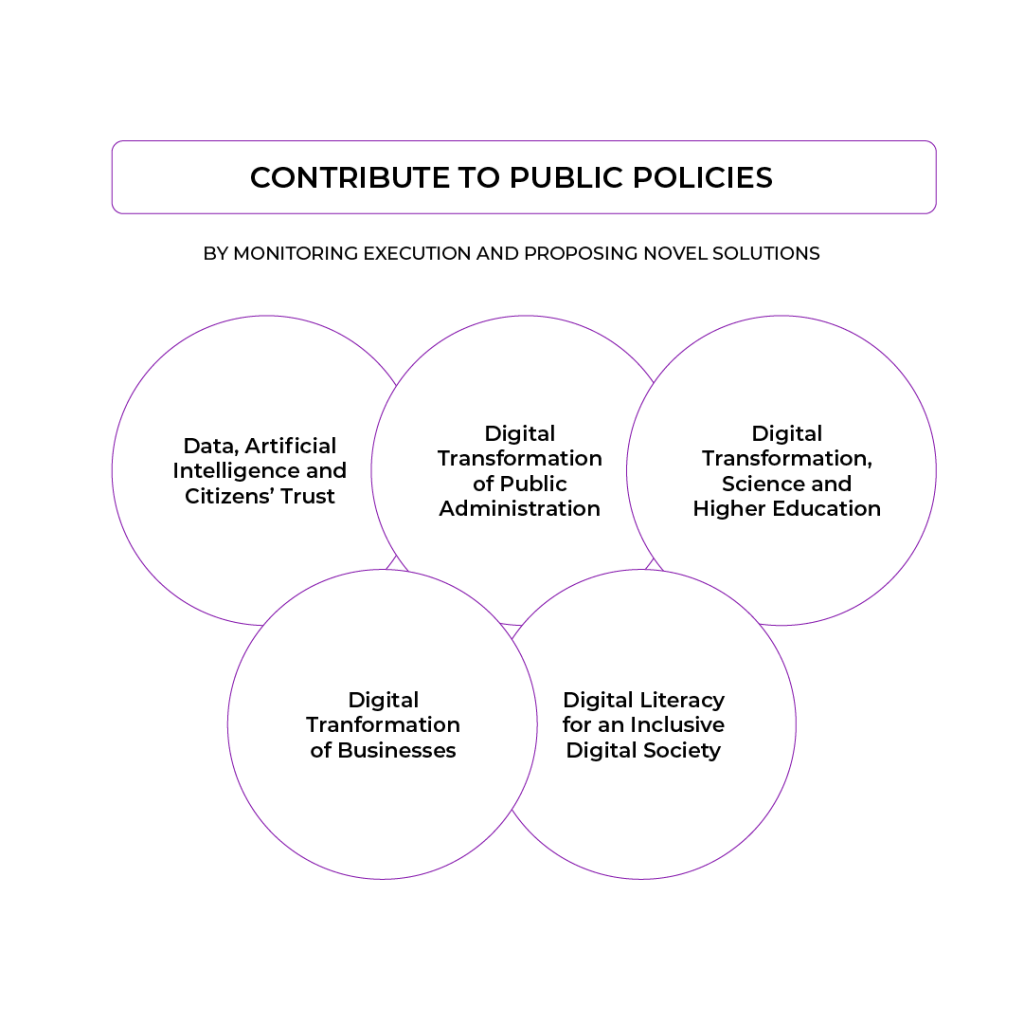
KEYWORDS
Digital transformation, AI and ethics, Digital business, Public administration digitalization, Digital inclusion, Digital higher education
